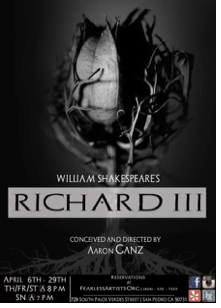CommentsGELFAND’S WORLD--Shakespeare's Richard III is a disturbing play to experience at any time, but it is particularly haunting in this era of ostentatious, authoritarian public lying.
As presented through April 29 by San Pedro's Elysium Conservatory Theatre, Richard III reminds us how evil gains the upper hand by camouflaging itself in words of love, loyalty, patriotism, and honor. As most of you will remember, Shakespeare's King Richard wins his way to the throne of England by killing off everyone who stands in his way. This includes his brother the Duke of Clarence, a collection of nobles who would otherwise have opposed him, various children (the two princes in the Tower of London), and a few others who, we are reminded, died at his hand prior to the actions depicted in the play.
Along the way, Richard manipulates people, including potential future wives, through lies and flattery. Those he cannot flatter or murder, he buys. Those he buys, often live (or die) to regret it.
It's the way that Richard tells lies with a straight face that is particularly troubling. It reminds us of what we are dealing with in real life. I suspect that in previous decades, audiences were less affected by this facet of Richard's behavior. At this moment in our history, it is like a taunt to anyone with sanity and a sense of honor. If a Shakespearian cast can bring this play to life, there is much to be felt and not a little to be learned.
That leads us to a mention of the casting. Richard is played by Kelley Pierre while Richmond, Richard's ultimate and final enemy, is played by Alina Burgos. Earlier audiences might have found it strange or even radical to cast these two English warriors using female actors, but it doesn't seem to be either bothersome or all that novel in this day. In conversation with director Aaron Ganz, it became obvious that they were chosen based on their ability to communicate the essence of the roles. Developing and presenting the inner lives of the characters using Shakespeare's words is the highest requirement in this art form. This demands not only diction -- the ability to speak the words fluently, one after the other -- but the ability to speak each line according to its meaning.
Most of us have experienced a performance of a Shakespeare play where the characters slog through the lines in a sing-song manner. Even when they know the words, they fall into the rhythm they find on the page rather than fighting to convey the meaning of each phrase and each complete sentence. That was not the case in this production.
And what words there are to be spoken.
Now is the winter of our discontent
Made glorious summer by this sun of York
And that's just the first two lines. In rereading Richard III, I was reminded of how much stunning language there is in this play. There is not quite the density of famous lines that you notice in Romeo and Juliet, but just to hear Queen Margaret cast her curse on Richard is worth the price of admission:
 On thee, the troubler of the poor world's peace!
On thee, the troubler of the poor world's peace!
The worm of conscience still begnaw thy soul!
Thy friends suspect for traitors while thou livest,
And take deep traitors for thy dearest friends!
No sleep close up that deadly eye of thine,
Unless it be whilst some tormenting dream
Affrights thee with a hell of ugly devils!
Thou elvish-mark'd, abortive, rooting hog!
Thou that wast seal'd in thy nativity
The slave of nature and the son of hell!
Thou slander of thy mother's heavy womb!
Thou loathed issue of thy father's loins!
Thou rag of honour! thou detested—
The play even has Richard's famous cry, "A horse! A horse! My kingdom for a horse!"
In reading through the entire script of Richard III, it is obvious that there are a lot of dramatic choices to be made. It starts with the length and the number of characters. The published text of 29,278 words is divided into five acts containing 25 scenes total. There are 63 characters. Where else are you going to find a script which includes roles for first murdererand for second murderer? Every director has to face making cuts in order to deliver a production that doesn't go on forever, and it is important that even smaller roles deliver, since they convey plot points and dramatic tensions. In this production, the ECT condensed the action into two acts of acceptable length.
Luckily, director Ganz had access to a number of talented young actors. Besides the contenders for the throne mentioned above, the weightiest roles fall to former queens and mothers of kings. Alina Burgos doubled as Queen Margaret, company veteran Rachel McVay was Queen Elizabeth, Victoria Grant was the Duchess of York, and newcomer Lara Repko played the intense role of Lady Anne.
What may set this production apart from so many others is its concentration on the suffering of the victims. The queens and queen mothers lament their lost husbands, fathers, and children, each one a victim killed by Richard. There are serious dramatic choices here. It is a chance for a female actor to chew the scenery or alternatively to sob quietly. This group mostly tends towards the loud and the bold. There can be a fine line between the emotive and the histrionic, and most of the time, the players hit the right notes.
Mention ought to be made of Beau Berglund, fairly new to the company (he appeared previously as an army officer in Three Sisters), who carries a heavy load in the role of Buckingham. There are a lot of lines to be spoken in the portrayal of a character who is by parts loyal, tempted into evil by riches, ultimately disgusted by betrayal, and who eventually runs afoul of Richard and loses his head. Berglund shows that he is developing range and emotive force in this performance.
Ben Diserens doubles as Hastings and the doomed Clarence, two roles that are important in carrying the plot forward, and are played credibly. Marcello Padilla is Tyrrel, a particularly loathsome character who is more than willing to kill children for a few pieces of gold, while Max Krauskopf portrays the servant Catesby in believable fashion.
The director takes a bit of dramatic license. At the beginning, the ghosts of men and women Richard will kill are present, each in dark clothing and stained with blood on face or clothing. Later, following Shakespeare's directions closely, they will torment Richard in his dream just prior to his death in battle.
Shakespeare provides both Richard and Richmond with a speech to the army just prior to the start of battle. In this production, director Ganz has substituted the battle speech from Henry V, giving it to Richmond. Burgos as Richmond delivers it in a rousing performance that grabbed the opening night audience. The original speech from Richard III isn't bad at all, but the speech from Henry V is one of the great moments in English literature and a worthy addition.
Ganz also puts in a little Richard II in this performance, to no obvious decrement. In these small additions, Ganz is apparently following one line of theatrical tradition in the Richard III canon.
In all, this was a strong cast which also included Georgia Pringle, Anna Booher, Christine Hauer, Danny Travieso, and Lucas Nelson in smaller but decently played roles.
There are a couple of other points to be made.
Kelley Pierre in person appears something like a taller, more slender version of comedic actress Kate McKinnon. She has a way of smiling without obvious artifice during Richard's more treacherous moments. It will be interesting to see her in other roles.
As mentioned previously, this company is dealing with the challenges of developing a promising new venue that used to be the old Ante's Restaurant in San Pedro. The cast is dealing with some reverberation problems in the main room. Your correspondent found that sitting closer to Richard's throne made the dialogue more understandable. The company recently refurbished the floor and seems to be working on proper placement of props and fixing the acoustics.
No discussion of Richard III would be complete without giving mention to the argument that Shakespeare's Richard -- as the evil, manipulative murderer -- is a complete fabrication created by the Tudor monarchy after Richard's foe Richmond became Henry VII. Mystery writer Josephine Tey, in The Daughter of Time, makes the case that Richard was probably a tolerable king and that Henry VII had more reason for killing the princes in the Tower than Richard ever had. In any case, the Shakespeare play provides remarkable reading for any era, and Tey's book has been rated as one of the finest mystery stories ever written. There is a lot of meat in this 500 year old tale.
(Bob Gelfand writes on science, culture, and politics for CityWatch. He can be reached at [email protected])
-cw
















